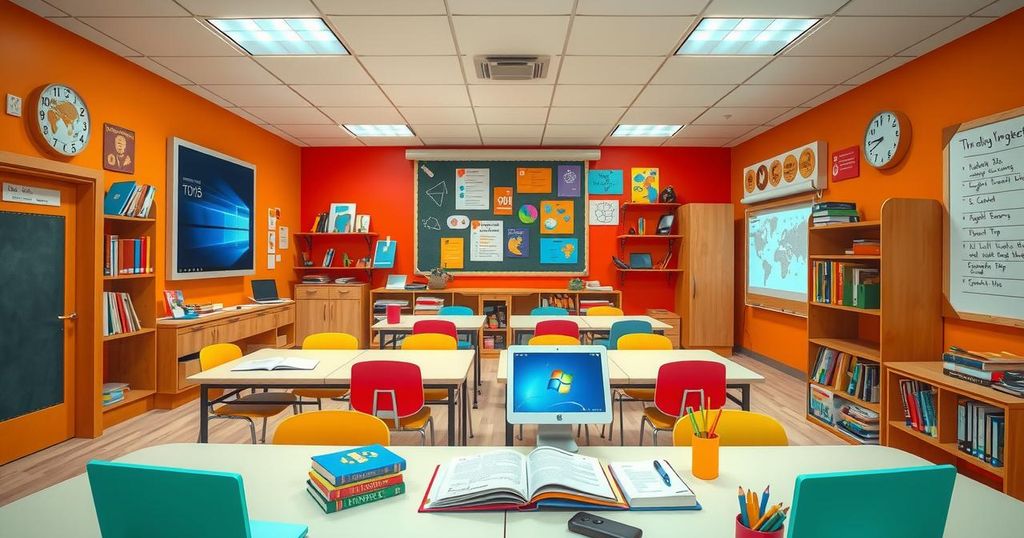Navigating AI and Human Intelligence: Insights from Dr. Michael Harvey
The podcast episode features Dr. Michael Harvey discussing the relationship between artificial and human intelligence. As AI evolves, educators face the challenge of redefining what intelligence means and how to preserve human capabilities. Harvey emphasizes the importance of community and relational learning in shaping education, along with AI’s role as an enhancement tool rather than a replacement. His vision reimagines education to support emotional intelligence and critical thinking amid technological shifts.
As artificial intelligence (AI) rapidly advances, the conversation is starting to shift. We’re moving away from questions of capability and into murky waters about purpose. What AI can do is being overshadowed by what it should do, especially in the domains of learning and societal norms. Educators, especially, are wrestling with these changes, pondering what it means to truly be intelligent now that machines are becoming part of our lives. A striking McKinsey report predicts that by 2030, up to 30% of American work hours could be managed by machines, highlighting a pressing need. Skills like critical thinking and emotional intelligence are more important than ever.
Now, in this AI-dominated landscape, how do we ensure that human intelligence (HI) isn’t just preserved but also elevated? Can technology, especially AI, be a bridge for connection rather than a wall of replacement? In a recent episode of the podcast “Just Thinking,” host Kevin Dougherty sat down with Dr. Michael Harvey, an educator from Marlborough Boys College in New Zealand. Dr. Harvey’s insights, grounded in Māori traditions and his work with the Human Intelligence Movement, shed light on how AI can complement rather than compete with human intelligence.
During the conversation, Dr. Harvey brought up some key points. The frameworks he discusses, particularly regarding indigenous and relational learning in New Zealand, focus on the community over the individual—a fresh perspective against the backdrop of Western views on intelligence. This collective approach not only reshapes how we view learning but also raises questions about measures of success in education.
Moreover, Dr. Harvey elaborated on how carefully utilized AI tools can boost social-emotional learning. By tapping into data-driven insights, educators can gain a better understanding of student well-being and engagement, adapting their strategies to suit individual needs. It’s a thoughtful approach that doesn’t shy away from technology, but rather embraces it as a way to support students and teachers alike.
He also advocates for a radical rethinking of education. Suggestions include dissolving traditional age-based grade levels and encouraging role reversals in classroom dynamics, where students and teachers learn from each other. This vision aligns with a shifting landscape toward more human-centered learning.
Dr. Michael Harvey isn’t just another educator; he’s a forward-thinker shaped by a wealth of experience both in New Zealand and abroad. As Director of E-learning and Electronics, he taps into innovative technologies to create experiences steeped in both modern advancements and traditional Māori values. His work reflects a deep commitment to reshaping education—focusing on equity, innovation, and genuine human connections within complex learning environments.
His ideas invite us to reconsider not just AI’s role in our lives, but what education could look like in a future where intelligence—both artificial and human—is viewed through a lens of community and collaboration, rather than competition.
In summary, the discussion between Dr. Michael Harvey and Kevin Dougherty brings forth a vital exploration of how AI can elevate rather than overshadow human intelligence. With predictions suggesting a vast shift in work dynamics by 2030, skills like emotional intelligence and critical thinking take center stage. Harvey’s vision for education acts as a roadmap for navigating these changes—proposing a more collective and human-centric approach grounded in traditional values. As we advance into this new era, the task will be to blend technology with humanity, preserving the unique traits that define us.
Original Source: marketscale.com




Post Comment